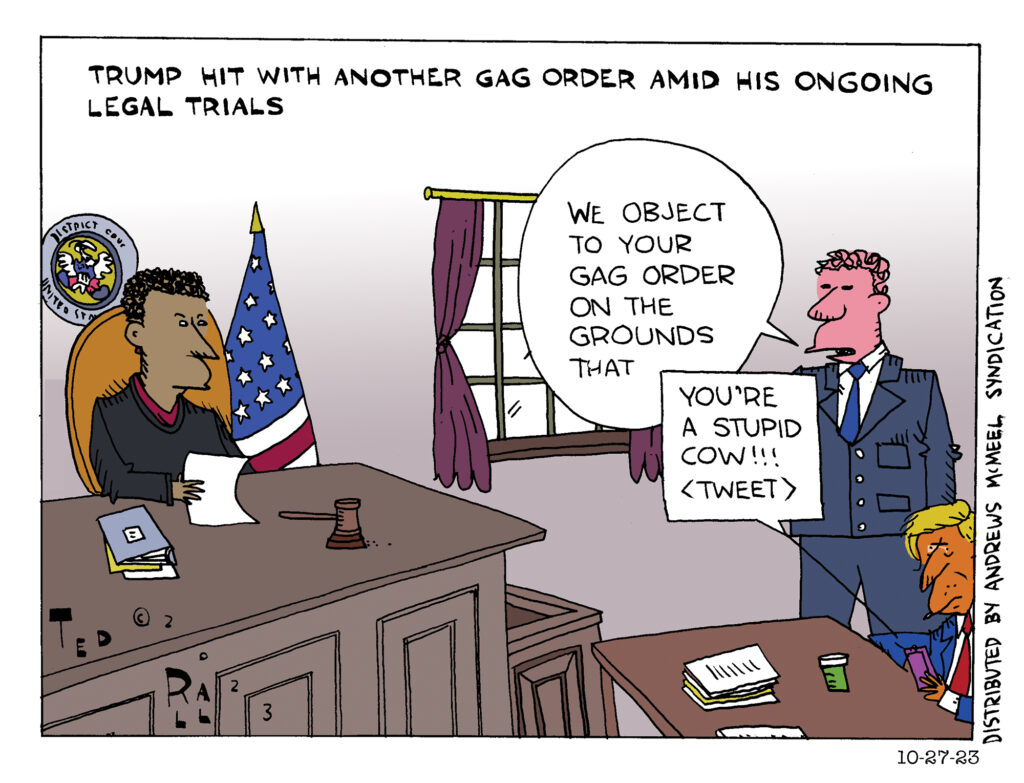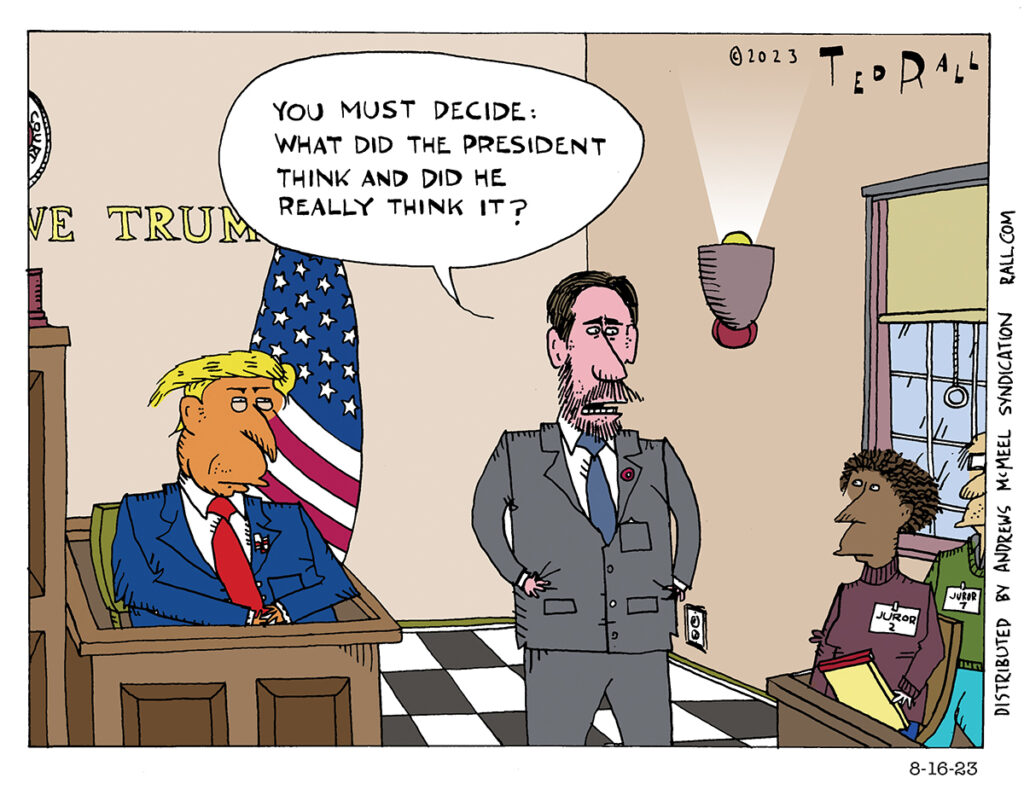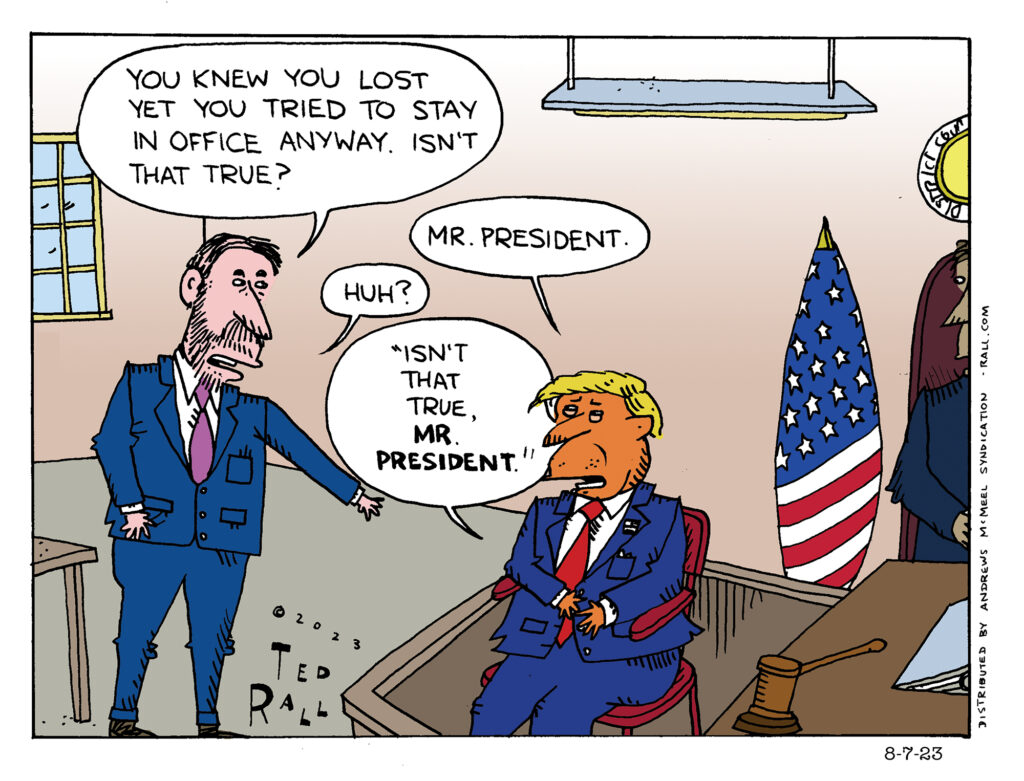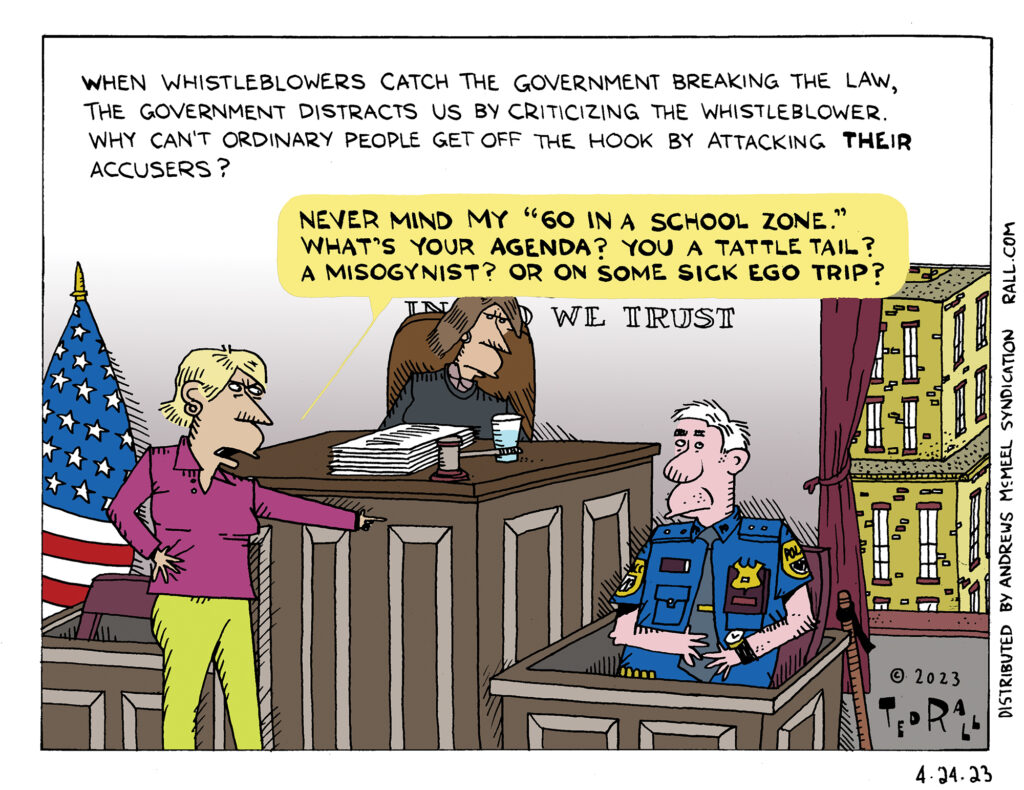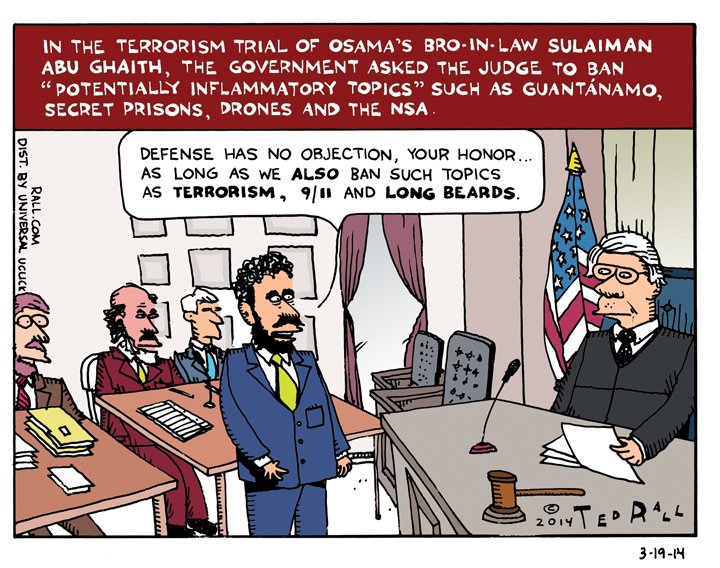Former President Donald Trump has been hit by another gag order prohibiting him from disparaging witnesses and court officials in his public statements. Getting him to shut up, however, seems like an attempt to defy the laws of physics.
What, If Anything, Did the President Think?
During the Watergate scandal, a recurring question was asked: What did President [Nixon] know and when did he know it? Special Counsel Jack Smith’s January 6th-related charges against Donald Trump prompt a similar question, albeit one that is fundamentally unknowable. If he truly believed that Biden cheated him out of the 2020 election, his efforts to reverse the results were nothing of the sort, but merely his attempt to set things right.
In Defense of Defamation Lawsuits
“He that filches from me my good name robs me of that which not enriches him, and makes me poor indeed,” Iago tells Othello in Shakespeare’s play. The belief that defamation is serious, and that the perpetrator of libel or slander deserves to be punished, is a standard trope in popular culture.
The Hollywood screenwriter falsely accused of communist sympathies struggles to clear his name in the 1950s. The journalist breaks a big story only to be smeared by the rich and powerful men whose crimes he exposed. The narrative of the innocent person sent to prison for a crime he didn’t commit relies on dual tragedies, the injustice of undeserved suffering as well as a conviction that results in society wrongly believing that the condemned is an evildoer.
In the real world, however, there is little sympathy for a person whose reputation has been damaged by a falsehood spread by a malicious enemy. One example is actor Johnny Depp’s $50 million defamation lawsuit against his ex-wife Amber Heard, who has countersued him for $100 million. Both parties accuse each other of physical and emotional abuse.
Much of the public commentary in response to Depp’s trial, currently underway in Virginia, is of the eye-rolling “they both deserve each other” variety. This happens a lot.
I’ve learned from personal experience as the plaintiff in two defamation cases that it’s often hard for society to separate the victim from his victimizer. Some suspect that the victim somehow brought the libel down on herself. Others think that whatever was said wasn’t that serious, and that the target of slander ought to brush it off and move on. Sometimes the libeler benefits from high social status that prompts outside observers to sympathize with them—the media elites who sided with snide Gawker over downscale Hulk Hogan in the sex-tape case come to mind. Many people simply don’t like lawsuits or those who file them.
Americans’ bias against defamation plaintiffs has created a lopsided judicial landscape in which it is nearly impossible for even the most meritorious defamation claims to make it to a jury trial, much less result in a substantial damage award.
In 1999 I wrote a cover story for The Village Voice that criticized graphic novelist Art Spiegelman for, among other things, deploying disproportionate power within New York’s publishing world. As if to prove my point, the artist’s allies and colleagues went after me with threats of violence. One of Spiegelman’s buddies, a pornographic illustrator whose name I won’t mention here because it would only further his further desire to aggrandize himself at my expense, decided to teach me a lesson—via identity theft. He wrote an obnoxious email, signed my name to it, and sent it to my colleagues and employers. My editor at the New York Times op-ed page believed it was from me and fired me.
As if that wasn’t bad enough, the creep sent out more out more messages under my name.
My lawyer hired a proto-cyberdetective to identify him, costing me thousands of dollars. After we tracked him down, we sent several cease-and-desist letters—which he ignored. To the contrary, he replied that he had done nothing wrong and would feel free to use my name in the future however he pleased.
I sued. New York case law is clear: impersonation of a journalist or “man of letters” is libel per se, or an act of written defamation so extreme that it is necessary only to prove that it happened, not to prove specific lost business opportunities. At a pretrial hearing a judge commented that the defendant “couldn’t have done more harm to Mr. Rall if he had walked up behind him in the street and shot him in the head.”
Because Spiegelman’s avenger didn’t have a defense, he filed for one delay after another. Online, he characterized me as a humorless jerk who was angry that he had made fun of me. Both tactics worked. My lawyer eventually died of brain cancer; my case is still technically pending on the court docket 23 years later. And many people in the cartooning community think that the two of us deserve each other, or that he’s a free-speech martyr. Never mind that I had never done anything to the guy, met him, or even heard of him guy before he tried to destroy my career.
I know I was right. The law was on my side. But those things didn’t matter.
The last two decades have seen a flurry of legislation that has made justice even more elusive for defamation plaintiffs. The most pernicious are “anti-SLAPP” laws, which stop discovery, dismiss cases and force plaintiffs to pay defendants’ legal fees. Because anti-SLAPP laws have been sold to state legislators and the public as a tool for small individual defendants to fight off big corporate plaintiffs in frivolous liable claims, they are popular with Republicans and Democrats alike: the ACLU, former labor secretary Robert Reich and TV host John Oliver are all fans of anti-SLAPP laws.
Actually, anti-SLAPP laws solve a problem that doesn’t exist. If a plaintiff lashes out at you with a libel lawsuit, the first thing your lawyer will do is file something called a “motion for summary judgment.” If the lawsuit is baseless, the judge will throw it out right at the start, and you’ll walk away paying zero to nominal legal fees.
Because there is no distinction under U.S. law between rich and poor plaintiffs and defendants, anti-SLAPP laws perversely protect some of the worst people in the world against their victims. Donald Trump used anti-SLAPP against Stormy Daniels after she sued him for calling her a con woman; her case was tossed and she was ordered to pay Trump’s $300,000 legal fees. Trump also used anti-SLAPP to further bankrupt a victim of his Trump University scam. He’s currently using anti-SLAPP against Jean Carroll, who says the former president raped her in a dressing room.
Libel-loving newspapers have been having a field day with anti-SLAPP. There is no question that The New York Times gleefully and intentionally smeared Sarah Palin as inspiring a mass shooter, yet wants the ex-Alaska governor to pay their fees—even though New York’s anti-SLAPP law was enacted after she sued. The National Enquirer knew that Richard Simmons wasn’t transitioning from male to female, yet Photoshopped images of him wearing women’s clothes on its cover story to that effect. He was right, they were wrong, he sued, they hit him with anti-SLAPP, the victim was ordered to pay his attacker $130,000. My readers are well aware of how The Los Angeles Times, then owned by the LAPD pension fund, intentionally smeared me and went after me with anti-SLAPP as well.
From the Scarlet Letter to people’s tendency to turn away from the homeless and physically disabled to the observation by moviemakers that audiences tend to lose affection for a character after he suffers a wound, the psychology of our reptilian brain often causes us to feel revulsion for fellow humans visibly suffering from an injury. The plaintiff often notices the glint of contempt in the eyes of the judge in a defamation case: why can’t you just stop whining and go away?
But the proper way to consider someone sleeping on the street is to think that there but for the grace of God go you. And the same thing is true when you look at a defamation case. Johnny Depp might just be a wuss lying about getting beaten up by his younger wife. But it’s far more likely that he thinks he was destroyed by ruinous lies, and that he has no choice but to sue in order to set the record straight. It’s a serious claim, one that anyone in his position should have the right to explore before a judge and jury.
(Ted Rall (Twitter: @tedrall), the political cartoonist, columnist and graphic novelist, is the author of a new graphic novel about a journalist gone bad, “The Stringer.” Order one today. You can support Ted’s hard-hitting political cartoons and columns and see his work first by sponsoring his work on Patreon.)
Burning a Police Station Led to Justice hi hi

As people of good will celebrate or merely breathe a sigh of relief in response to the conviction of Minneapolis police officer Derek Chauvin in the videotaped torture and murder of George Floyd, it is worth noting that this victory would likely not have occurred had it not been for a spectacular act of property destruction.
Yes, there was that damning video. True, the police chief testified for the prosecution. Those factors caused Chauvin’s rare conviction. But you can’t convict unless you indict first—and there was no move to indict Chauvin before city officials were scared into filing charges.
Floyd was killed May 25, 2020. Three days later, demonstrators burned down the Minneapolis Third Precinct police headquarters, which had been abandoned by fleeing cops. On May 29, the next day after the conflagration, prosecutors announced charges against Chauvin.
In October 2020 a right-wing “bugaloo boi” was charged with setting the building ablaze. But no one knew that right-wing infiltrators had been involved at the time of Chauvin’s arrest.
Throughout the modern history of the American left there has been a raging debate between militant pacifists who believe violence has no place in the struggle for political emancipation and revolutionaries who think powerful institutions and individuals will never relinquish control or allow the radical solutions we need to our worst problems unless they face violence or the credible threat thereof.
(Many on the left do not believe that destruction of property is a form of violence. Ignoring this question in this essay because it would be a distraction from the issue at hand, I use here “violence” as shorthand for any act of political resistance or protest which goes beyond physical passivity, including vandalism, arson, etc.)
From the 1980s until the current Black Lives Matter movement, the pacifists won the argument. Marches against Reagan’s budget cuts and globalization, LGBTQA demonstrations and antiwar protests were coordinated with local authorities to obtain parade permits and internally disciplined by so-called, ironically violent “peace police” who separated violent pro-“black bloc” marchers from the cops. When I raised the temperature of my speech to the Occupy rally in D.C., shouting pacifist organizers dressed me down afterwards for what they believed to have been incitement.
Everyone is for nonviolence as a tactic against oppression. Nonviolence is the dominant tactic to be used against a system we primarily oppose precisely because of its violence at home and abroad. But no one intelligent, no one who studies history, can deny that revolutionary change — the sweeping transfer of power from one class to another — has never resulted from the victory of a purely nonviolent movement. Indeed, the past 40 years of leftist activism in America, a period 99% characterized by nonviolent protest, is a case study in failure. Reagan’s destruction of the post-New Deal social contract was thoroughly internalized by presidents of both parties, including Barack Obama. Outsourcing American jobs and crushing labor unions is standard practice. We fight one war after another, none justified, all of them doomed efforts though we can’t admit it. We can’t even increase the minimum wage.
No one knows whether the conviction of former Officer Chauvin will set a precedent that holds cops accountable for killing unarmed suspects in their custody. Personally, I doubt it. Very few police killings play out on video over nine minutes; defense attorneys can create a bucketload of reasonable doubt among jurors who wonder what they would do in the course of a few confusing seconds. As Minneapolis Mayor Jacob Frey pointed out before Chauvin was charged: “We are not talking about a split-second decision that was made incorrectly,” Frey said. “There’s somewhere around 300 seconds in those five minutes — every one of which that officer could have turned back, every second of which he could have removed his knee from George Floyd’s neck.” Frey called for Chauvin to be charged, but only after two days of rioting raised fears that the police had lost control of the city.
That’s when city officials decided to throw Chauvin to the wolves in a trial with a surprising feature: the police chief testifying against one of his own officers.
What we do know is that Chauvin’s conviction was a rare victory for a left unaccustomed to winning even when, as in the case of the brutal beating of Rodney King, the facts are not in question. We also know that that victory followed days of riots punctuated by a spectacular act of violence that terrified the powers that be into doing the right thing.
(Ted Rall (Twitter: @tedrall), the political cartoonist, columnist and graphic novelist, is the author of “Political Suicide: The Fight for the Soul of the Democratic Party.” You can support Ted’s hard-hitting political cartoons and columns and see his work first by sponsoring his work on Patreon.)

